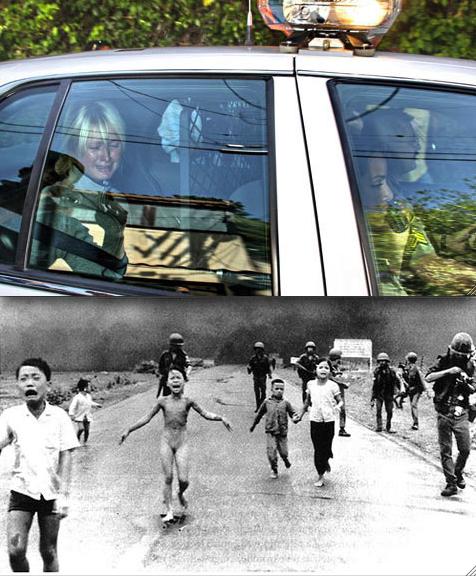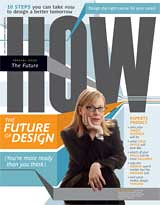Two Brief Moments in Time

Photographs by Nick Ut, top photo June 8, 2007, bottom photo June 8, 1972
On the sunbaked drive of a palace in West Hollywood, a young socialite weeps within the confines of a police cruiser, shielded from the questing cameras and machine-gun voices of frenzied paparazzi. She does not weep because she has been cruelly stripped of all her worldly possessions by a fascist government. Nor does she weep because she has been permanently displaced due to her family’s political affiliations. She does not weep because she is starving or dying of malnutrition and she does not weep because her family was slaughtered in a barrage of military bullets. She does not weep because her village was disintegrated in the fiery flash of napalm and she does not weep because she had been photographed in 1972 running across Route-1 in South Vietnam, screaming “too hot too hot!,” the skin of her back seared, a young girl running with her pain and confusion alongside a handful of bawling children while their village succumbed to a wartime apocalypse.
The young socialite wept because she had been remanded to the state of California to serve out a meager sentence of twenty-three days, a mere short-timer in a furnished cell, with three hots and a cot, as they used to say. Once she is released, in no time at all, she will regain all the accoutrements of her wealth and fame, but the world’s citizens, much like the fleeing nine year old child on that battered strip of Route-1, captured tempestuously by the expert lens of a photographer by the name of Nick Ut, who, coincidentally, captured the photo of a weeping Paris Hilton the same exact day thirty five years ago, must carry on with their sorry burdens.
The very idea of justice, or injustice—which is far more prevalent— is one that has haunted me for some time. With all that is transpiring in this fragile world, from the separation of families due to the immigration sweeps in states as varied as Connecticut and Ohio, to the photo in the Times of two Palestinian boys in American hand-me-downs scraping their father’s blood from the walls of their home in Gaza, I’ve long been shaken out of my sense of quiet panic and historical ineptitude. I resolved to arm myself against the tyranny of misinformation and rampant stupidity, but every response I would put to query remained specious at best. I am not an expert in economic policy, nor could I profess to being especially knowledgeable in political affairs. But I am not so blinkered that I do not ask pointed questions, particularly about the origins of our existence.
Who determines where we will fall upon inception? Whose hand conducts the rolling of the dice, the turn of the roulette wheel? It is a form unanswerable and unassailable who dictates our births and our pangs. For if this bit of smoke we refer to as the deity of modern religion were given bodily form, imagine all the law suits the multitudes would file in search of mitigating justice. There would be lines bisecting the earth from end to end, for this deity would stand before the tribunal of the people, tried for what some would consider to be egregious crimes against humanity. Just think about it for a moment. How different would your life be if you were born into a favela in Brazil, as opposed to a middle-class home in Cranford, New Jersey?
I often find myself overly concerned with the universe’s dilemma. Our very randomness is what confounds me. It is this that inspires the creative spirit to seek out who we are as a race, in vain, in pain, in order to discern why one is doomed to dust and poverty and why another is bereft of the agony of a toiling existence. It is the artist’s task, visual and otherwise, to make sense of this disorder, to interpret the poetry of the random, and to try and bring justice into a world that sorely requires it. If a profound knowledge of history is enough to subtract the soul-killing fear of our daily lives, when we are so easily mired in the crowdsource of information, then this could be shared in a demotic language, one that could be understood, or resonate, with the people. If we heed the lessons of history, then we could truly become masters of our domain.
The photo taken by Mr. Ut, on June 8th, 1972, is a monumental study of history in action. It is burned into generational memory, a profound reminder of the horrors of Vietnam, and proof that another individual’s agony could be transmuted into an artist’s majestic expression. One only has to examine Picasso’s “Guernica” to see the truth in this. The artist tracks the evil invisible, for so often it traverses the night undetected, sly and oily, with the moonless shimmer of a mindless sturgeon.
I am reminded of Lodge Kerrigan’s powerful social indictment, “Keane.” In the film, the camera obsessively tracks the daily travails of the titular character, who may or may not have lost his daughter in the Port Authority bus terminal. We watch this mentally unbalanced character as he eats shabby meals, babbles incoherently, drinks to excess, fucks in a lady’s toilet, snorts cocaine, flourishes disability checks, sleeps on a highway’s grassy divider, beats a man severely, and, ultimately, kidnaps the eight-year old daughter of a woman who he’d befriended in a seedy New Jersey hotel. Surrounded by the run of humanity, who pass this bedeviled man as if he does not exist, it is easy to note the parallel with our own lives among the dispossessed, who we pass obliviously on the beat streets of the city as they sleep on the sidewalks, shoot heroin on building stoops, walk with a menacing talk, and play the part of transparent pariahs. In Keane, we see the promise of democracy in ruins. He is the perennial outlier, the shadowman who skulks along society’s fringes undetected, a danger to others and to himself. I am rooting for a world that will be divested of blindness, so that it can see the people like Keane, and strive for the proper medicine for the mendicant soul.
But, for today, all I know for sure is this: we are possessed of mysterious organs and mysterious skin, and our looping lives are the emblematic dispersal of riddle and befuddlement. Oh the better to preach joys upon. Throughout all the horrors, we persevere, dreaming specks in the universal wonder, struggling to see the sun through the thorny trees. Every now and then, may we look to a new day with an unglancing eye, drink in the joy, and leave the death and sorrow to the angels, if only for a brief peace.
Special Thanks to Edwin Rivera


















3 Comments:
debbie -
Just wanted you to know that it was a great show again today. it was really great to hear from alan: he has such great talent, perspective and experience... I really enjoyed his words.
But I will tell you - I was really surprised by your monologue today. I'm not quite sure why, but I was completely expecting something having to do with apple, their innovation, consciousness to design, and the impact they've made within the design community.. something to maybe tie in with what alan's doing in his work now ... But what i heard meant so much more than my expectation ever could - making me question why I ever assumed such a cliche idea anyhow.
This entire mess of a celebrity being treated like an actual citizen shouldn't come as much shock, but thanks to a mystified, celeb-obsessed society - it has been everywhere, even finding its way into an interview between fox news and former astronaut Buzz Aldrin (what would you expect from fox, anyhow) -- but my point within all that is that you said it today -- that it is my responsibility, as a designer, artist, human, etc... to raise the tough questions and to bring the sticky subjects to light. It is my responsibility to use what I've been given in the way I see best - and it is my responsibility to keep going, even when it's ''too hot''.
Thanks so much for your words and dedication, They propel my thoughts and impact my inspiration. Keep up the good work - and on a side note... I'm really looking forward to these last two weeks of design matters, they're going to be fantastic!
Have a great weekend, Debbie! :: dane.
Powerful photographic juxtaposition. I need to take a shower.
"I'm still discovering right up to this moment, that it is only by living completely in this world that one learns to have faith. … I mean living unreservedly in life's duties, problems, successes and failures, experiences and perplexities. In so doing we throw ourselves completely into the arms of God.'" -Dietrich Bonhoeffer
I read that last night and it felt like an appropriate response to your post.
Post a Comment
<< Home